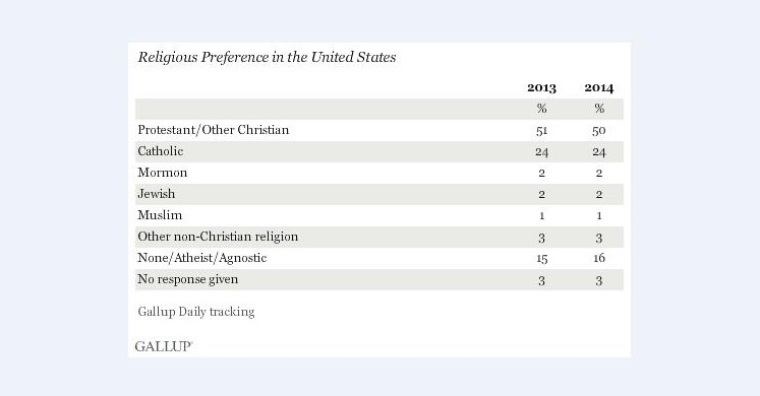3 in 4 Americans identify as Christians, more than half attend church at least monthly

PRINCETON, N.J. (Christian Examiner) – Gallup polling throughout 2014 found that three out of four Americans identified themselves with the Christian faith.
Gallup Daily tracking conducted 173,490 interviews from Jan. 2 through Dec. 21 to compile the findings.
Among those who named a faith preference, half described themselves as Protestant or other non-Catholic Christian tradition, about a quarter selected Catholic, two percent are Mormon and another two percent, Jewish. Muslims composed about one percent of respondents and 16 percent chose none/agnostic/atheist in the surveys. Three percent of those polled did not respond.
The 2014 study also measured Americans' worship attendance habits.
Forty-one percent claimed to attend church, synagogue or mosque weekly (33 percent), or almost every week (8 percent), and another 12 percent said they gather for corporate worship about once a month -- or 53 percent who assemble with fellow adherents regularly. But 47 percent reported seldom (24 percent) or never (21 percent) gathering to practice their faith with others or declined to answer the question (two percent).
Attendance among the major religious groups varied widely with 75 percent of Mormons going to services weekly or almost weekly and 53 percent of Protestants sharing the same behavior. Half of Muslims are similarly faithful to attend and only 45 percent of Catholics claim to worship together this regularly – compared to only 19 percent of Jews.
Gallup cautions that Americans' expression of an explicit religious identity is only one of many measures of religiosity, as is reported attendance.
Furthermore, Gallup's research points to a long term pattern in responding.
Its survey results in the 1950s showed up to 71 percent of Americans identified as Protestant and small percentages had no religious identity. However, Gallup said that comparing then and now, more than 90 percent of those who expressed a religious preference called themselves Christians in both timeframes.